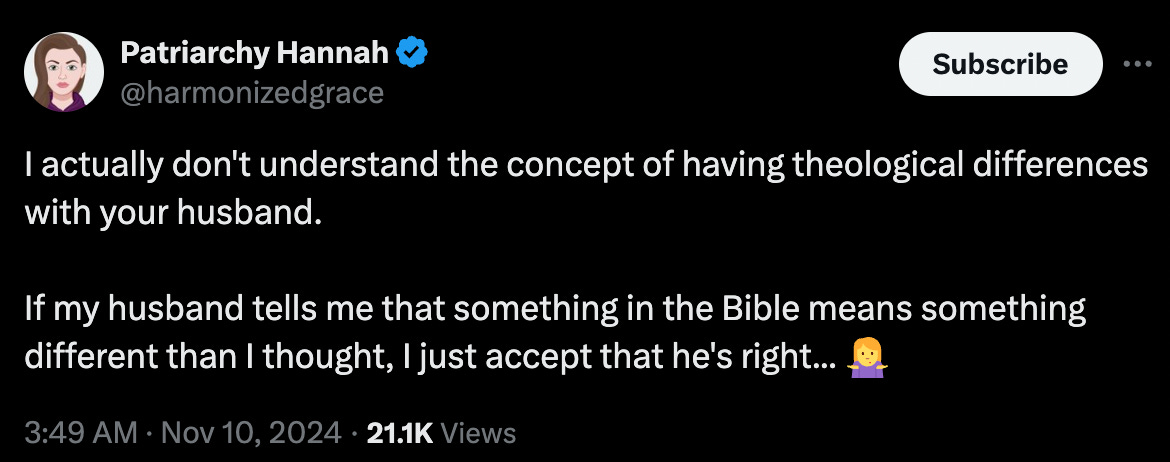The Handmaid’s Tale has become a cliché.
Pro-abortion activists have been donning red robes and white visors and stalking the Capitol plaza in protest of the American Christian right since President Donald Trump’s first campaign. We’re all familiar with the sight, and I’d be lying if I said I haven’t rolled my eyes at it in the (recent) past.
Their “hysteria,” as I’d seen it, was mostly based on a set of paranoid lies. If any religion in the world is guilty of enslaving women for the purposes of reproducing biomass, it’s Islam, not Christianity. Trump, for one, can hardly be classified as a religious rightist.
But I’d also be lying if I said I didn’t now see the legitimacy of some of these feminists’ fears – increasingly and especially on the right.
Traditionalism is having a comeback. Ten years ago, I felt the call to “return” to tradition. In a world characterized by listless consumerism and the tendency to eradicate all distinctions – between high and low, order and chaos, nation and nation, and men and women – a strict hierarchical conception of the world introduces some much-desired structure and sense. I love the traditional Latin mass. I love that, as a Christian, I am constrained by the moral law to do what is right, rather than abandoned to the vicissitudes of whim, mood, or desire.
Yet I hate that Christians on the right have tacitly accepted so much that is untrue simply because it presents itself as anti-“woke” or anti- “feminist.”
The right has a problem with promiscuous politics — a lack of discernment. The rise and popularity of men like Andrew Tate — and his Catholic, Orthodox, and Protestant imitators, who repeat ad nauseum and in unison that women are created primarily for total subservience to men and for male pleasure — is a testament to this broader unwillingness or inability to discern. It is a testament to the temptation of ideology.
If you believe I’m overstating, or that the people I’m describing are immutably “fringe,” or that this simply isn’t a legitimate problem, mark my words: give it five years. We’ve seen crazier ideas go mainstream before. The only people who are surprised by this are people who aren’t extremely online. People say “online” isn’t real. They’re wrong: the internet paves the way for reality. Reality is the internet going the speed limit. The destination is already set.
The internet has become a powerful incubator of cultural trends, shaping the zeitgeist in real time. Increasingly, individuals align themselves with online avatars, assembling their identities from a mix of ideological fragments circulating in what we might call the “memeplex.” Here, popularity becomes currency; the viral nature of a meme can generate a false sense of truth.
Concepts like transgender identity, which emerged from early gender theories by pedophile “sexologist” John Money in the 1960s, gained widespread traction through platforms like Tumblr and later permeated mainstream social media. Transgenderism, I believe, was the canary in the coalmine for this phenomenon in which people turn to online communities to construct their identities—a trend that has only accelerated as real-life social bonds weaken. We would be utterly mistaken to think that this tendency — which is superpolitical – would not apply to the right.
Now, rather than the female body’s generative capacity being diminished, as it was by abortion-friendly feminism for decades, masculinist influencers posit that women are only good for sex and motherhood. Everything else a woman has ever done or ever could do is not only secondary in importance – it is actually a detriment to her true purpose, definitionally. Women, it is said, have nothing good to contribute to public life aside from male pleasure, babies, and sourdough. Male virtue, on the other hand, is taken for granted. If only women cease their whoring, henpecking, and girlbossing, and instead start having more sex with their husbands, men would be free to become the virtuous heroes they are by nature.
But the reality is that young women now grow up alongside men who have been mainlining violent pornography since they were children. Pornography as a habit doubles as a moral education: they have been trained to be gratified by the abject subjugation of women. If the boys’ conscience eventually gets the best of them, the theology that makes most sense to them — that which is the loudest and most powerful in the space where, as I mentioned, people are constructing their identities — is usually the masculinity grift.
The red pill speaks to where they’re most damaged. It speaks to men whose sexual anxiety defines their lives. Rather than grappling with the humanity of the opposite sex, they can more easily cleave to popular narratives that confirm all their priors about what women are for, while simultaneously absolving themselves of their guilt. Pornography addiction and masculinist heresy go hand in glove, pardon the pun, even while the figureheads encourage men to stop masturbating, for this reason: it does not fundamentally change or challenge their formation with regards to women.
These men are entering the Church quickly and eagerly, seeking virgins to impregnate. The lack of healing is revealed by their dedication to red pill ideology baptized in proof-texted theology.
Fundamentally, having been well-trained by bad habits, they still don’t understand women as fully human. Education is for human flourishing; masculinist ideologues don’t believe education is good for women. They don’t believe women have anything to offer the world aside from their sexuality. They don’t believe married women are entitled to refuse sex immediately postpartum. They don’t believe in NFP, which is presented as a sort of “loophole” birth control for “feminist” Catholics. They don’t believe women need rest in between pregnancies. They tend take a “line go up” attitude toward fertility that diminishes the needs of individual women and children. They don’t believe women should work — even if the man makes no money and they’re breeding themselves into poverty.
This isn’t Christianity. This isn’t the love of Christ.
Many conservative women, especially online, have crowned themselves Beatrices of the modern underworld, acting as helpmeets to masculinist influencers, “guiding” young women to disabuse themselves of “feminism,” which is presented as the monocausal explanation for every problem the world currently faces. In The Handmaid’s Tale, a character called Aunt Lydia was charged with oversight of the young women, performing ideological damage control for male abuse. If the women faced a material problem, it was recast as a problem of mindset or a lack of her virtue. The parallels are striking.
I am two essays deep into a series I’ve begun in order to systematically debunk these narratives, which I have seen play out in real life to the absolute detriment of faithful women, and children. Yes, I’m talking about abuse. I’m talking about women approaching death in maternity wards because they’ve had too many children in too close succession for their bodies to handle. I’m talking about husbands and fathers with pornography addiction who blame their lapses on their wives being postpartum. I’m talking about people refusing to educate their girls in any way aside from homemaking. There was some confusion recently by a reader who imagined I was using some kind of microwaved liberal feminism to fight back. For anyone who got that impression, I implore you to release the imposition of black and white thinking, and read it again. Let me explain my purposes:
My project is not just not ideological, it is anti-ideological. I am attempting to provide historical and theological context rather than fight ideology with ideology. We need to reset the terms of the debate before this gets out of hand. The internet-borne ideological identity is the problem.
It is utterly unfair and dishonest to approach the modern world, the modern dating scene, and modern marriage from an ideological standpoint, where any and all misgivings that young women have about modern men can be explained away and skirted so easily while simultaneously spilling so much ink on female failures—which I’ve never denied are real, too. The historical record is what we need to understand the truth. The historical record is what I'm presenting.
I refuse to play the Aunt Lydia role in this ascendant, commercial “antifeminism” movement that makes memes out of people and buries legitimate disfunction under the cover of traditionalist utopia. We are not memes. We are not called to present ourselves online as perfect adherents to ideologies borne of reactionary trends. We are human beings. And as human beings, we are called to take up the Cross — the Truth — and live in the imperfect world, bearing it courageously. I love my daughters and my son far too much to encourage anything short of that embrace.






The comments here that say “I personally haven’t encountered this so I have doubts about it being real” are so confusing to me. It’s happening—I know people in real life who are embracing these very ideologies & lifestyle practices. Not having experienced something firsthand doesn’t mean it’s being overstated by those who have knowledge or experience with it. This article is prophetic in the sense that it describes a truth about something that is already happening and may become even more widespread. It is not making a mountain of a molehill. This ideology is dangerous and it’s real.
Thank you for this Helen. I listened to your podcast and I must confess that I was initially confused by your new approach with this series. I am technically gen z, but my bubble, at least from college and grad school, is hyperwoke Ivy League types. I still feel like I would need to fight for the right to be seen as valuable as a homemaker instead of a McKinsey consultant or woke academic within this group. The idea that people actually think like the weird online trads irl is so crazy to me (I’m guessing that’s why you’ve gotten pushback, people can’t imagine it) but it makes logical sense that it would happen. As you say, 15 years ago many thought transgender tumblr was an online fringe. I really appreciate you explaining where you’re coming from here. Even if these “trad” people don’t come to dominate the culture, the truth does matter, so pushing back against the ideology is not a bad thing.